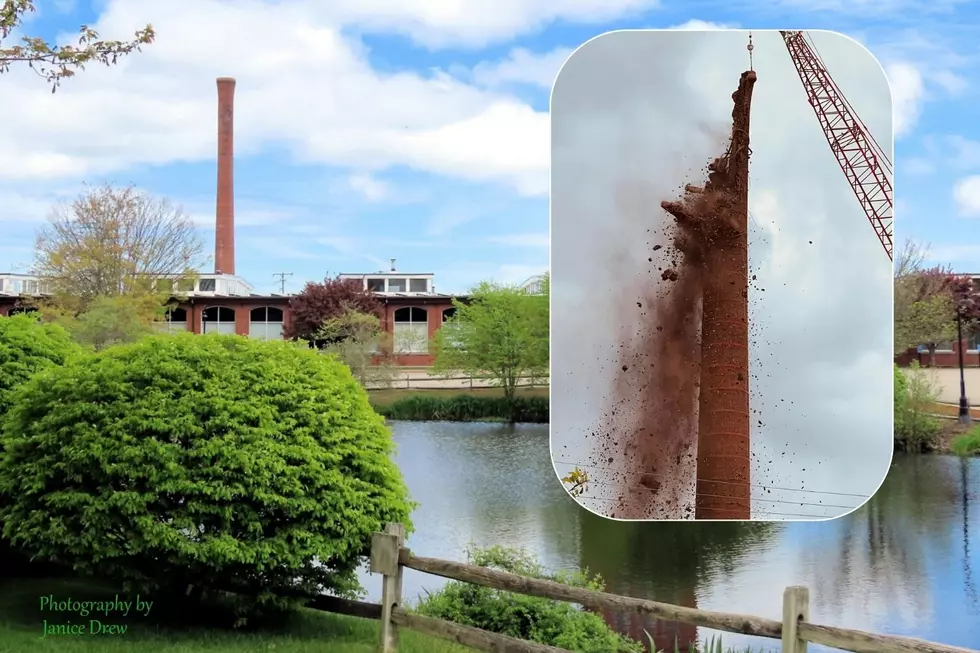
Plymouth’s Iconic Cordage Park Smokestack Is Demolished
An iconic Plymouth landmark is no more, after the smokestack at Cordage Park was demolished this morning.
The smokestack was erected around 1899 for the then-bustling Plymouth Cordage Company, which was the world’s leading manufacturer of rope.
The 210-foot structure, created with 500,000 bricks, was originally built for the mill’s power plant, but it became so much more. With Cordage Park’s close proximity to Plymouth Harbor, it served as a beacon for sailors and a monument for the thousands of families who were part of the company throughout its existence.
There had been attempts to save the smokestack – something the current owners of the property wanted to see happen – but it was recently discovered that its structural integrity was in question after cracks were found, and it was decided that it was too risky to allow it to remain standing.
For the first time in 123 years, the smokestack is not overlooking America’s Hometown.

The Plymouth Cordage Company was started by Bourne Spooner and friends William Lovering Jr., John Dodd and John Russell in 1824. According to the history of the company, Spooner was employed in a ropewalk in New Orleans, which utilized slave labor. As an abolitionist, Spooner returned home to Plymouth, armed with his rope-making knowledge, and sought to manufacture cordage with free labor (free as in the worker’s choice to do so, not free as in unpaid).
Spooner had acquired the perfect land for the company in North Plymouth, right on the harbor, and the railroad even came directly into the property beginning in 1845.
Although the main building was the 1,050-foot ropewalk – that’s the name given to the place where the rope is laid out and woven together – the Plymouth Cordage Company continued to expand with multiple buildings and more and more property acquired.
Plymouth Cordage became more than just a company, however; it became a community. Employees could rent homes from the company, or buy tracts of land to build their own, and low-interest loans were offered.
Schools were built, along with cafeterias, an auditorium, a gymnasium, a nutritional clinic, a bathhouse, a men’s club, and a sports field complete with bleachers, and where motion pictures were shown beginning in 1908, the very earliest days of the medium. There was even the Plymouth Cordage Band, with uniforms and instruments paid for by the company.
For generations, the Plymouth Cordage Company was the heartbeat of the town. According to the Old Colony Memorial, when the company closed down in 1965, the Plymouth Cordage Company had been employing about 20 percent of the town’s 12,000 residents.
In the 1980s, Cordage Park was revived as commercial space and an important shopping center for Plymouth and Kingston in the years before the Independence Mall (now the Kingston Collection) opened in 1989.
In the 1990s, Cordage Park became home to Quincy College’s Plymouth campus, while also housing other offices, restaurants and specialty shops. A flea market was also held on weekends in one of the buildings for a time.
Eventually, a Walmart opened on the far side of Cordage Park in the early part of the new millennium, and it was designed to have an aesthetic that fit in with the red brick of the rest of the park’s buildings. However, that store closed down not long after and was later demolished when Walmart opened a new supercenter in Plymouth’s Colony Place shopping plaza a few miles down the road.
In recent years, as the site became the terminus for the Old Colony commuter rail line of the MBTA, a developer has turned Cordage Park into the Cordage Commerce Center, with 350,000 square feet of mill space for various commercial uses. There is also a plan to build luxury condominiums on the property, while still maintaining the historical integrity and look of the property.
The Cordage Commerce Center also houses the Plymouth Cordage Museum, dedicated to the history of the company and to Plymouth’s role in the ropemaking industry.
However, even as all this history remains standing, the smokestack is now gone from the landscape of Plymouth forever.
Here are 50 of your favorite retail chains that no longer exist.
50 Famous Brands That No Longer Exist
More From WBSM-AM/AM 1420









